|

Crayfish burrow, Madison Co., KY.
(*photo credit)
June 1, 2011 Why Nuclear
Power? Is it Congressional Payoff Time?
Those
of us who have questioned the utility of nuclear power for four decades keep
wondering: Why do both Democrats and Republicans keep wanting to insert
"Nuclear" in energy policy legislation in 2011? Don't 8.9 earthquakes wake them
up?
Not clean! Remember
the health of uranium miners and process workers; don't forget waste storage
and ultimate disposal problems; recall that coal is used in nuclear fuel (see
May 23rd on this Website).
Not
secure! Remember Chernobyl. Too much said on inherent nuclear powerplant
insecurity will give terrorists ideas -- and why supply a crazy group with ideas
about storage facilities? Many of these local powersites have fuel rods stored
there in water-cooled conditions. Power outages could create dangerous
scenarios.
Not popular! On
March 3, 2011 the Wall Street Journal said that the nuclear power subsidy
was the most popular budget cut available at this time; in fact, one
survey showed 57% of the American people choosing elimination of nuclear power
funding. The public is not interested in putting more public money into nuclear
power when private investment could produce lower utility rates elsewhere (wind
and geothermal).
Not
cheap! Of course coal-fueled power has been cheaper (but now is being
outstripped by wind) because coal was not paying for full environmental costs.
Wind is out ahead and solar is coming on fast. If new natural gas sources that
were slated to be the cheapest interim fuel pay all environmental costs
(wastewater treatment, etc.), the gas savings will soon disappear. Eight-
billion-dollar nuclear powerplants lacking governmental subsidy are out of the
utilities' reach. Why spend taxpayer money?
Not
ready! Nuclear facilities take years to plan, site, fund, build, and clear
important regulation hurdles. From the moment of inception to switching on the
power it takes at least a decade or more. Quick fixes are energy efficiency
measures (see May 10) along with domestic wind and solar applications;
moderate-term ones are geothermal and retrofitting small-scale hydropower dams;
and longer time spans are needed for wind and solar farms. Nuclear is a very
long-term and quite risky investment.
Why
now? There is one answer, and that is the money angle, not the cost angle,
but the payoff $$$ given to support Congress members' elections. One estimate
has been $650,000,000 over years, but we do not know actual amounts. The fact
is much of the money may be covered under other donations. However, many within
the U.S. legislative branch need to show his or her benefits -- it is time to
"fish or cut bait."
Prayer:
Lord, help us all to come to know what we are doing and to omit doing that which
is not good to do.

Wild senna (Cassia hebecarpa),nectar source for the cloudless sulphur butterfly.
(*photo credit)June 2, 2011 Protect
Silent Space in a Busy, Connected World
This
is an addition on the former treatment "Cell Phone Use and Silent Space" (see
January 19, 2008). True, cell phones are filling a communications niche in our
active world though, hopefully not when driving or attempting to pray or talk to
others. The intrusiveness of cell phones give us pause and question
over-connectedness on the part of our society. What is wrong with being free
from connections to others for some periods of time? One parent's answer was,
"But I would not know what she is doing." A recent photo shows a crowd in
Warsaw, Poland with all people standing with one ear to a cell phone. We do not
know yet how much constant cell phone use could harm the brain, but time will
tell.
Going
beyond one gadget (though virtually omnipresent in our world) is more difficult
for those who hate gadgets. However, other intrusive items and practices
include: social networking (Facebook and Twitter), land phones, television,
radio, cars and general traffic, lawn mowers, sirens, airplanes, jackhammers,
motorcycles, yelling kids, and on and on. In idyllic times birds and especially
crows broke the silence; crickets, cow bells, roosters crowing, and church
bells added to the charm. Silence has never been perfect and has always been a
disadvantage for deaf people who cannot be alerted by alarms. Still, blessed
silence!
Like
any musical performance, the silent interludes are needed as the moments in the
composition between movements and instrument changes. Pure sound, no matter how
soothing, without silent space is unbalanced. So is our lives. We have many
places where sound enters and affects us, from a lullaby to a call for help.
Tell the over-connected, busy people among whom we live that they need silent
space, whether in the evening or early morning or in the middle of the work day
or during annual retreat. Silence is like a Sabbath in our life, the rest after
action and before further action (see Sounds & Silence on this website).
Again,
let us emphasize that over-connectedness is not a good thing. The one who is
always present to another is really never at the perfect disposal of anyone.
Busyness is not really a sign of importance; rather it signifies that little
true reflection occurs. We live in an age when everyone needs to take some
period and rethink where he or she is going. The insecurity, hostility, and
stress of our age are not good; nor is the tendency to bankruptcy, to
concentration of wealth in a supposed democracy, and to the movement of
populations to states of luxury. A world gone crazy is one in need of silence
-- a highly infringed-on area of the commons required for meaningful
communication. True, written material can also be worrisome, but it generally
does not demand an instant response, though with email that is changing as well.
Prayer:
Lord, help us to be creative enough with our time in the day, week, month,
and year to find the silent space that we really need to plot out our lives
anew, and to make a less stressful world for all to live in peace.

Summer explorations.
(*photo credit)June 3, 2011 Defend
the U.S. Environmental Protection Agency
The
United States Environmental Protection Agency (USEPA) has a record that
is public and can be retrieved easily. Lack of knowledge of this record is now
the heart of a partisan battle today. Merely furnishing information about its
achievements will not keep it from losing its future programs, because virtually
all know its basic record and some want its activities to cease. You may not
have been around at its inception after the first Earth Day; this agency was
born during the Nixon Administration and had bipartisan support. However, now
things have turned politically nasty under the guise of budget-watching and
fiscal responsibility.
At various times in its
four-decade history, USEPA has stood out in defense of the environment often
ahead of the general public. Now is one such time and focuses on climate change
legislation, and the reporting and regulation of carbon dioxide emissions. As
in its past history, opposition has come principally from exploitative groups
targeted to be regulated for polluting the great outdoors.
Get
the nation's moral leaders to direct attention of those who pride themselves in
being pro-life, as did letters from us in mid-March that went to policymakers
and numerous moral leaders. What applies to abortion and assisted suicide
issues must extend to the web of life, including the life of this planet on
which all physical life depends. Too many are strangely silent or they take a
pro-death stance with respect to our troubled Earth. Morally speaking,
defending the USEPA by confronting its critics in a forceful public way must be
done now. If we do not defend the USEPA, we are allowing our country to lead
the world in ignoring carbon dioxide reduction strategies. How are we to expect
emerging nations, especially China and India, to follow suit if we continue to
allow rising carbon dioxide levels in this country? In this critical decade we
will either reduce emissions and begin to save our world from drastic climate
change, or we will allow for two to four degree temperature rises that will melt
ice caps, cause oceans to rise, and displace millions of people.
If
you are a silent person, please overcome your hesitancy. Pro-life leaders,
abandon your partisanship and contact your representatives and speak up before
it is too late for the only place in the universe known to have life as we know
it. One of the best ways to speak up is to defend the USEPA, its enforcement
procedures, its research on the best and fairest regulations, and it stance on
all matters of protection. The agency needs room to function and adequate
funding to get the job done. Early in American history when James Madison was
leader of the House of Representatives, that body was seeking to stifle the
highly contentious Jay Treaty (between the U.S. and Great Britain) through
withholding funding from treaty provisions. The current House knows the power
of the purse. Champion the USEPA right now!
Prayer:
Teach us, Lord, to speak openly about vital issues.

Walking trail through Bernheim Arboretum and Research Forest.
(*photo credit)
June 4, 2011 National
Trails: A Great Infrastructure Investment
For those of us who strive
to support new jobs through infrastructure investment, trail-making guarantees
future payback at low investment costs. The National Trails Act of 1968 may
have envisioned the companion to the Eisenhower Interstate Highway Network, but
that dream is only partly true. National Trails Day tells us to look at
the national trail system and find entire states (especially in the Midwest)
with no system at all. Yes, our country needs improved infrastructure including
better natural gas utility lines, renewable energy development, better public
schools and more public transit; we also need better regional and interlocking
trails, along with needed rest stops, lodging and other associated amenities.
Every time I see hikers and bikers on our narrow and dangerous secondary rural
roads and then enter the nearby Interstate 75 (and others), the contrast is
striking. One group with motorized vehicles is able to traverse the over forty
thousand miles of the safest highway system in the world; the other group
observes signs to keep off public highway built with taxpayer money -- and is
required to take great risks competing with autos and trucks on secondary roads
with no shoulders or lanes. No, hikers and bikers do not need to be on the
current Interstate lanes for that would be deadly. Rather they need parallel
lanes suited for their needs. A few years back an associate at ASPI and biker,
Russell Parms, was struck and killed by a hit-and-run student driver who was
late for Monday morning class.
Yes, bikers and hikers are
unable to go easily and safely from place to place. Shouldn't these energy
savers have an alternative safe trail network? Certainly, such a system has its
bits and pieces in "rails to trails" sections, in the Appalachian Trail, the
Pacific Crest Trail and other local and regional trail segments. Had it not
been for the recent Great Recession and the tight state budgets these pieces of
a possible national trail network would already have fallen into place. Our
needs include expensive over- or under-passes, but existing rights-of-way on
Interstates or public rural roads could suffice.
This
reflection is not meant to be an exercise in laying out a possible hiking/biking
network with a densely filled map that looks like the Interstate System.
Granted, some states have initiated their trail systems, and others lag with
finances being the excuse for delay. Rather, this is "bang for the
infrastructure buck," or getting the most out of a tight budget. If the trails
system were adequate, interconnected, and included rest facilities, and were
given national publicity, users would respond. Vacationers would use the trail
network with such advantages as low prices, family togetherness, less stress and
congestion, fresh air, wholesome physical exercise, and occasional great scenic
views.
Prayer:
Lord, help us to see that national trails are good investments for our people
and the improved quality of their lives.

A heavenly view in June.
(*photo credit)June 5, 2011 The Grace
of Holy Discontent and Earthhealing
On
this feast of the Ascension, we look heavenward to where Jesus is taking
leave of his disciples. They stand in a state of stupor, a feeling of being
left behind with a task and no paternal leader. Too often, that feeling on
Ascension comes over many people in the Church today. The immediate task at
hand is before them and no "father" figure with immediate answers to guide
them. Ironically, this is where we stand on whether earthhealing is truly
pro-life. Some of us know that life on this planet demands work; others see
value in claiming their stance in being pro-life. Can the two interests meet
and cooperate with each other?
In
a partisan way some would think this Congress is the most pro-life of any in
history. My contention is that it may prove to be the LEAST. To miss the
opportunity to take a moral leadership in merging these two interest groups into
one would be regrettable. Today, Americans look for leadership from this
paternalistic way -- if only church leaders would see what is right to do and
lead us to do it. Really? Is that the best approach? Scripturally, a
participative role of the rank-and-file emerges with leaders sometimes taking
their time to respond -- but their honest response of "amen" is a mark of
leadership. Consider St. Peter's coming to understand that the Good News must
go out to ALL the world.
What
is at stake is to challenge a prevailing paternalistic spirit among those who
follow religious, economic, or academic leaders. Those who strive to "think
with the Church" ought to realize that this means primarily thinking within
the Church community. We certainly need to do more than attempt to read the
thoughts of leaders; we must contribute to the entire process of following the
Spirit, who moves us to think within the Church as a community of believers.
Good thinkers must think, not attempt to read minds, for such could pretend or
be a possible charlatan..
Thinking
at times can be filled with a discontent that comes when one has to
contemplate issues that leaders have not considered adequately. This situation
triggers a feeling of uneasiness on the part of the believer. Responsibility
falls on those driven to think. Discontent includes the uneasiness that
solutions are not forthcoming. Is this discontent necessary or even holy? The
discontent comes from the Holy Spirit within us; the holiness
comes from a happiness that we experience in being on the right track, even if
problems are not solved. Contentment with solutions may be lacking, but
happiness within is possible. Comfort is not the mark of happiness; following
the Lord in this struggle is the true direction of the Ascension event. The
Ascension opens the door; the solutions await ordinary time. Holy discontent
includes the fact I will not solve the problem myself, but I risk addressing it.
Also I am willing to invite others to enter this struggle.
Prayer:
Lord, let us go on with the task ahead, know we must continue in order to
find a solution, and become more aware that our effort is itself only part of
the final solution.

Blue eyed grass, Sisyrinchium angustifolium, at edge of forest.
(*photo credit)June 6, 2011 Can
People of Holy Discontent Be Happy?
I
was confronted with the title as a question that involves me. Certainly I am
discontented about a number of issues and so my happiness is called into
question. At the heart of the matter I agree with my mother in her old age who
said over and over, "I'm happy, happy, happy." Our family was deeply impressed
by her happiness and each prayed that in their old age they would feel the same
through a sense of gratitude to God for a wonderful life. In some ways I do
feel that sense of happiness even though I work in my senior years on issues
that are filled with impending struggle and discontent. Distinctions need to be
made.
Happiness
comes when we know we are doing what God wants and that in some way we are
moving towards a distant horizon, an indefinite future time but still a definite
eternal future. Happiness is realizing that all does not depend on us, but we
are with the Lord and with others on the journey. Happiness is accepting our
limitations and working as well as we can with them. Happiness is being on the
side of the poor and finding friends.
Discontent
arises with being on the wrong road, thinking all depends on us, refusing to
accept inherent limitations of self, and attempting to discover companionship on
the side of wealth, fame, and power. On the other hand, the term "holy
discontent" implies suffering through what it takes to be on the right road, to
be dependent on God, knowingly to be limited in human talents and resources, and
to be accepted as of little account for siding with the poor and to associate
with them -- even today's downtrodden. Holy discontent is to be unsettled
because the solutions to our problems are still a way from settlement, and we
may not be present for the solution -- or even get earthly credit for what we
do.
This act of being counted as insignificant is really a trigger for happiness in
the words of St. Ignatius and many others who were on the road to sanctity. We
become more like Christ in the way we proceed, and that is important for
believers. Thus, just as tranquility is not peace, so comfort and contentment
are not the same as happiness. In reflecting we discover that comfort can be
quite deceiving and thus not a true indicator of spiritual life -- in fact, it
could be the evil spirit at work. Holy discontent is the sure knowledge that
through prayer and discernment we are going in the right direction with
encouragement and advice of others whose assurances are most necessary.
In
the struggle to solve problems, a holy discontent may be intensified by
questions and objections from peers. In such cases, prayerful discernment and
conversation may be required in order to overcome differences and make the issue
better understood -- even necessitating an abandonment of the problem area by
the discontented person without disturbing an interior happiness.
Prayer:
Lord, make us ready to do your will and in so doing to see discontent as part of
our sacrificial oblation to you.

Athabasca Falls. Jasper National Park, Canada.
(*photo credit)
June 7, 2011 Ten
Reasons for Small-Scale Hydropower Now
Renewable
energy needs our attention as the nation settles on a responsible energy mix
that moves away from fossil and nuclear fuels with their inherent difficulties.
That means all benign forms of renewables must be emphasized. I live almost
within sight of one of these potential hydropower sources on the Kentucky
River. Currently, small-scale hydropower is a renewable energy source needing
further attention for ten reasons:
1.
Plentiful sites exist. A multitude of small-scale hydropower sites are
scattered in all states; some 79,000 dams exist as of last count.
2.
The cumulative resource potential is immense. Currently, some 97% of the
dams are untapped for hydropower generation.
3.
Small owners are generally in charge. Many of these sites are in private
and local community hands and thus development would directly benefit the local
community and investors.
4.
Such sites are more benign than large-scale sites. The development of
small-scale sites does not require new flooded areas; these larger areas are
the bane of many hydropower sites throughout the world. Such developed sites
result in major disruptions of wildlife habitats and migration routes, along
with displacement of human populations (numbered in hundreds of thousands in the
instance of the Three Gorges site in China).
5.
Cost of development of sites is low with respect to amount of power
generated, and thus payback for investment is rapid in contrast to nuclear power
expansion or large-scale solar farms.
6.
Safety and security issues are not major concerns as are at nuclear sites
where stored materials require constant monitoring.
7. Rapid development is
possible. Source utilization in this age of petroleum-supply uncertainty
must be rapid. In contrast, nuclear power takes years and even decades to
develop. If energized, existing dams could supply 7.3 GW of energy by 2025.
8.
A remedy for intermittent power exists. While the energy supply is
somewhat continuous in given periods of plentiful water supply, there is an
intermittent character to it. However, small-scale hydropower is generated at
night when the sun is down.
9.
Environmental damage associated with existing dams has already occurred;
thus development of this energy source perhaps has the least impact of any
land-based renewable energy sources.
10.
Toxic emissions do not result from hydropower production.
Prayer:
Lord, help us understand the potential of water, which you freely give us.
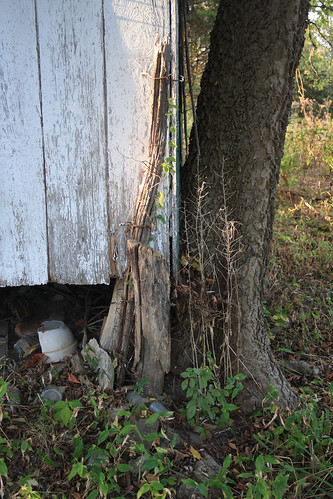
Artifacts under an old henhouse.
(*photo credit)June 8, 2011 Can
Religionless Spirituality Heal Our Earth?
We
are deeply concerned with a variety of friends and contacts who tell us that
they have a spirituality but see no need for religion. On February 4, 2011 we
gave reasons why religion is utterly needed today as part of the Earthhealing
process, namely: religion encourages individual civility and civic involvement;
religious life offers prophetic witness; and religion stimulates compassion
within community. We all need to worship publicly, for this shows our
dependence on the Most High -- and that we cannot do it all ourselves.
Furthermore, good spirituality affords us the chance to see we are limited --
and that inspiration drives us to find God together with others.
A
spirituality without religion is like sailing a ship without a rudder or keel;
it is hard to steady the course of life's journey of faith without sound
navigation. Spirit tells us we are more than matter -- but certainly not
perfect. Spiritualities may be unhealthy, indifferent and poorly directed.
Ships leak; seamanship can be poor; and the vessel may head in the wrong
direction. Religion gives us wind direction, a period to examine the boat's
condition and awareness that we need others to help. Merely declaring one has a
spirituality says little, for even Hitler and Stalin were "spirited" people. We
may seek interreligious and ecumenical cooperation; however, grouping
spiritualities together may allow a mix of those working together and those
hell-bent on disrupting our lives. Yes, terrorists are spirited people with
warped agendas.
Spiritualities
are generally private, but religion involves a public commitment to believe in
unity according to established discipline and common purpose. Broad gambits of
individualistic and loosely-held spiritualities say nothing of any public
commitment. While we need to be spirited enough to participate instead of
denying, excusing or escaping, we must also realize that the threefold
temptation unfortunately may not be overcome by an individual spirituality:
denial is to go it in private; excuse is that public commitment is unnecessary;
and escape is the constant allurement to perform meaningless and distracting
exercises.
Some
may say the threefold temptation also exists for religious-oriented people.
Yes, the temptation is certainly there among all of us, especially since the
damage is so disheartening, the healing is so broad-based in scope, and healers
are so distracted by the cacophony all around; it is clear we need assistance.
We need reinforcement of a community of believers' faithful witness to see
clearly the depths of damage; we need to know that we are not alone but are
assisted by the hand of the Almighty in the work before us; and we need the
focus that religious prayer and petition constantly give us.
Prayer:
Lord, give us courage to find a future that involves our healing ministry; give
us nourishment to carry on; and help us to remain focused on our goals.
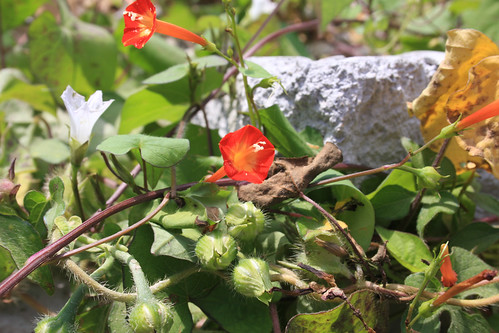
A tangle of weeds creates a natural bouquet.
(*photo credit)June 9, 2011 Activist
Options for Senior Citizens' Day
The myth that senior
retirees have little more to do than fish and drink coffee under the Golden
Arches needs investigation. Granted that is what some people do or would like
to do if they were not immobile. Caregivers for seniors wish their charges
could fish and go and gather some place; they list three classes of people:
doers, those wishing to be doers, and committed non-doers.
Senior
activists (hobbyists and meeting-goers) generally realize that they are
slowing down and have to pace themselves. They compensate by doing moderate
garden work or cooking or visiting others. Their mobility diminishes.
Compensation comes by discerning better projects or asking assistance to help
with the tasks at hand. Wisdom teaches us that we can act according to our
abilities and circumstances, and we can act even by talking and encouraging our
neighbor. Less demanding hobbies, closer to home visits to those in need,
volunteering at local churches and civic centers and a host of other
opportunities await the diminishing energetic activist. Self-motivation is
important for them.
Seniors
wishing to do things, are a class who are potentially available if they
could be creative even amid their limitations. I recall that Ralph, an aging
activist in his own right, could not leave home but acquired a ministry of
phoning other elderly people who wanted to converse; he would offer to sing and
play his musical instrument (via phone) for them, hoping in his fading days to
offer his own contribution to caring for others. Amazingly, those with greater
spiritual fortitude find things to do with themselves, and they seem to turn
their living circumstances into opportunities for others through email, phone,
letters, and personal conversation. However, this group is not always
self-motivated and needs the catalyst offered by caregivers and change agents.
Senior
caregivers are truly challenged by the non-doers who seem to be at loss as
to what to do. This could be a tragedy that can be removed by a firm belief in
the value of each individual's life and contribution to communal life. Some
seniors have been "shelved" because of physical or mental difficulties and so
others regard them of little worth. In fact, the habit of some elders being
asked to pray has far more meaning than the less-spiritual caregiver might
suspect. Believers enter a special world of reality that is moving our
universe far beyond the places of some who are always in the limelight. A
spiritual reality of the poor (who include the non-doers to a great degree) can
actually make them the ones who feed the hungry, that is, the spiritually hungry
whom Mother Teresa called a major group. Those prayers can suddenly transform
them into the "powerfully poor," for radical change does not come from the rich
or seemingly powerful. Give the non-doers new life and become an Easter person
to them.
Prayer:
Lord, help puzzled caregivers to find value in its senior citizens and to
encourage them to act in some simple way.
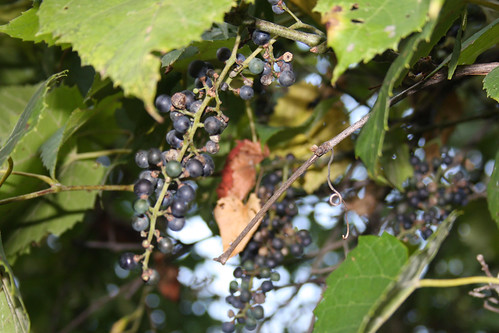
Wild grapes in the forest canopy provide food for many creatures.
(*photo credit)June 10, 2011 Crisis
Caused by Disparity of Wealth/Power
In
the 1970s, the early days of environmental crisis, the problems were directed to
sheer numbers of expanding world population. Over time and with arguments found
in such literature as The Contrasumers it became less fashionable to
blame the poor, and to see how much consumption by the affluent was less
conspicuous and yet a case of the problems of pollution. In fact, with time,
the culprits turned out to be "consumers," not ordinary poor folks, no matter
how far ordinary consumers distanced themselves from pollution sources (powerplant,
uranium mine, etc,). Arguments were obscured because the Union of the
Socialist Soviet Republics (USSR) and satellites were heavy environmental
polluters, and yet inhabitants were not excessive consumers nor wealthy either.
Eastern Germany was a foremost polluter by using lignite as a primary fuel:
lakes were contaminated; forests were damaged; the Chernobyl accident had laid
waste to valuable land and harmed or shortened lives of thousands of nearby
residents.
At
the same time these facts were considered, a new thought began to emerge: it is
not necessarily consumers but those who drive consumers to consume, namely
media, captains of the consuming culture and rich leaders of cultural change
that demand more and more consumption. Disparity of wealth had much to do with
disparity of power -- the ability of some to set trends that led to more and
more material consumption seemed to emerge.
With
time, social justice and eco-justice were more linked together, and the former
saw that environmental decline meant decline in social and community bonds;
furthermore, decline in social bonds means the decline in environment. Thus,
the fight for social justice and environmental protection are a single
struggle. Super-rich consumption triggers middle class consumption down through
the ladder of success-craven private vehicles, spacious housing, and expensive
foods. Cracking disparity is complex.
The environmental crisis
has not declined when the Chinese communist regime has become a foremost
capitalistic one, with a surging middle class clamoring also to enjoy what
current billionaires have. On the other hand, primitive societies in the Amazon
or New Guinea lived in harmony with nature for centuries without major disparity
or wealth. Among societies in our American Southwest when power became unequal,
natural environments suffered. The toll of excessive power and wealth go
hand-in-hand; environmental protection suffers. The argument may demand more
research. At least when higher technologies in industrializing nations demanded
more resources and the authorities had the power to obtain them, environments
tended to suffer. An uncontrolled materialism leads to wealth, and this to
uncontrolled consumption, and thus to environmental harm.
Prayer:
Lord, help us to unravel the mysteries of this environmental crisis and to see
how materialism has led to excess power and wealth -- and help us to make public
our discussions.
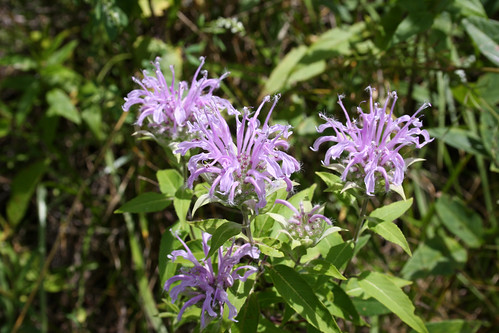
Wild bergamot, Monarda fistulosa. Washington Co., KY.
(*photo credit)June 11, 2011
Two Views of Possessions
Possessiveness
of land leads to a sense of privilege that is opposed by the just aspirations of
a free people who are naturally inclined to the Principle of Sharing. The Good
News is that these natural aspirations are God-given. To counter these
aspirations, those who are privileged with excess possessions require protection
of their possessions. Two views emerge from a reflection on the closure of the
commons and the struggle to obtain essential goods and that of obtaining
luxuries:
*
Greed is a virtue and Charity is the concern and decision of the
privileged, versus
Sharing is a virtue but
charity can be an exercise of power, and so doing justice is better than
merely giving to the needy in charity.
*
Consumers will be materially motivated to strive for greater shares of
the resource pie; and
*
Economic and corporate privilege knows best, no matter
what the world mess is, because poor are ignorant versus
The material pie is
limited; motivation should be directed to higher spiritual and qualitative
horizons.
Beware of the materially
privileged and realize that "the poor" hold the key to rising and saving the
Earth.
*
Democracy means complete free choice, and millionaires have a right to
become billionaires, versus
Democracy is harmed by
excessive wealth and Superrich inequalities hurt the human society.
*
Free market and free trade are articles of faith;
*
Credit energizes a culture of consumption, which influences people and
nations far and wide, versus
The market must be
subject to regulation and trade must be fair along with consumer rights
protected;
Capital and credit are
dangerous when left unregulated.
*
Governments are to be despised, complacent, disparaged, and manipulated
as a source of bail outs, and
*
Problems are solved solely by secular procedures, versus
Good government is
absolutely necessary for the sake of our wounded Earth and our global economy;
troubles stem from a lack of reverence and faith in the future.
----------------------
Prayer:
Lord, make us discerning people, able to see differences in the use and
possession of material things, to realize how significant they are, and to
explain the differences to others for the sake of better distribution of
resources.

Moon behind clouds at sunset.
(*photo credit)June 12, 2011
Pentecost and World Evangelization
Pentecost
means spreading Good News and the Acts of the Apostles account has a
variety of aspects all related to that spreading process:
Pentecost is God's
work, not ours. We may enter like children who are passive observers, and with
time develop into outgoing active participants who both spread and gather the
Word;
The
context is a prayerful atmosphere among the assembly;
The
fearfulness of the assembly is evident by reason of the locked doors at
this time of great distress;
The
suddenness of the Spirit's coming means we cannot anticipate the arrival,
for such events are beyond our reckoning;
The
powerful winds of change are meant to move us from our locked-in and
complacent ways of acting;
A
flame touches each in the assembled body and so the life of Church
involves all assembled. This individualized flame indicates that the Spirit
gives us unique gifts that must be used according to our individuality, and yet
be involved in our corporate body;
The
impulse is to move out from a semi-private visitation to the broad world
containing people from all the known regions of the world at that time -- a
global manifestation;
Empowerment
by the Holy Spirit helps us overcome our weakness and reluctance to speak out
and act in courage;
Spreading
the message involves speaking to others in tongues that they understand.
Language is becoming understood by others and they in turn can give feedback to
the messengers of Good News;
Witness
to events in the life of Christ is at the heart of our message to those who
await the Good News. This is the core message preached at the first Pentecost;
The
Audience is the assembled crowd from all over the world. This shows that
the Good News is not meant for the designated small number or for only Jewish
people, but rather for people of many lands and cultures -- though all have a
sense of anticipation; and
Breathing
is the added feature for we all need additional air or Spirit to allow us to
retain the energy to go forth again.
Prayer:
Holy Spirit, give us the grace to go out to others, authentically communicate
with them and share what each has, and then return to bring back other Good News
and to share in the broader-ranged spiritual community of Church.

On the move. Eastern box turtle, Terrapene carolina.
(*photo credit)June 13, 2011
Babel Dispersal Today and Beyond
Let
us make a name for ourselves so we will not be scattered about the whole earth.
(Genesis 11: 1-9)
There
are a number of interpretations of the story of the Babel dispersal of the
people into their own separate tongues. A literal interpretation may not be
overlooked, for it shows that the oneness of any communal people speaking a
single tongue can break apart through the pride and evil of individual people.
The coherence of community can be broken by individuality and selfishness. The
dispersal leads to new language expressions and through isolation new languages
emerge.
Theologically
there is more here. The breaking apart of the common thread that bound the
primitive people together was a godly pride in the building of their cities, the
Tower of Babel being a symbol of reaching out to obtain divine greatness. As
they used their ingenuity to build and the petroleum product to be the binding,
we are reminded that a common language of greed exists today as well, and that
this also uses petroleum products as well in trying to bind people together --
but in selfishness the binding comes apart and the people are left with isolated
fragments of a civilization. Materialism, based on advanced technologies, can
bring about a pride and a disruption of common goals and lead to basic
insecurities among peoples.
Pentecost
is a counter-current flowing in the opposite direction of the dissipation of a
fragmenting materialism. It is the spiritual return or coming together, and
this is Good News. The material interest that divides people into selfish
automatons and isolated units is countered by the power of the Spirit to bring
us back together as a single grouping. We recognize the power of God in our
lives; we see the work we are called to do as a participation in spiritual
empowerment; we begin to see the need for others -- those in Church and those
beyond.
Technology
is a promise or peril. Technology is a tool that can be used in spreading
the Good News. The "babel" of a misdirected tower or form of communication has
been perverted by selfishness into a dividing symbol; instead of truly
congregating people it sets them apart from each other. The power to bring
folks together is used to make them separate and aloof from each other. A
privileged class that speaks the language of capitalistic greed becomes removed
from the great mass of people who are divided and scratching for a living as
best they can. A sense of commons is lacking here and must be restored -- and
that is the task of evangelistic people. Abandoned towers of Babel exist all
around, and those who wanted to build them, babble on about their fading dreams
of glory. So be it, but Good News brings about a gathering.
Prayer:
Lord, let us see the dangers of a Babel where people make names (privileges) for
themselves and forget others' needs; help us to champion the Pentecost spirit of
togetherness.

Tiger lily continues to thrive in an abandoned garden.
(*photo credit)June 14, 2011 Is
Good News a Two-Way Street?
When
we communicate with others, do we do so as solitary speakers of truth and demand
their listening, or do we become hearers as well as bearers of "Good News"? The
first is a one-way sending of information, and the second is a two-way street.
One could ask whether this question pertains to general apologetics, or to a
broader methodology that includes this "info" website and its series of
reflections. The more narrow approach has been discussed especially in Asian
religious circles, for some Christians promote the idea that Christianity as a
minority religion has much to give AND much to learn from others. A one-way
street associated with older forms of evangelization emphasized that the bearer
has something to "share" with others -- namely, that which is being offered,
with only the expectation of the other is to listen.
The
traditionalist Christian may argue that spiritual sharing is not like an
economic transfer, namely, that a material exchange between two parties involves
trading item for item, or money of some accepted value for items. Another could
argue that this bearing of the Word is similar to an academic exercise of
sharing knowledge by knower to the unlearned in a lecture hall, with some
questions asked and discussed. Sharing Good News is personal. We share Christ
the Word with others; he comes and communicates with and among others.
However, Good News flows somehow in two directions, namely from an organized
church community through bearers to individuals or groups. In the process the
bearer is changed by the culture of the hearers of the word, and that
transformative change is a reception that can be carried back to the launching
community. Primitive cultures and even plants and animals have much to give, for
God's creative word has gone out to all the world and is worth being received,
honored and celebrated. In the receptive process we are changed through
openness to the world, and so the Word triggers and encourages a two-way
street.
On
this website we try to reveal the sights, sounds, tastes, smells, and feelings
of nature's flora and fauna. Healing is more than lists of healing medicines
developed by experts. This is ultimately a conversation with Earth's
creatures. This becomes a "blogging" between hearers and the wounded. We are
healed through healing. Good News is the beginning of a conversation with
Earth's creatures, for our command (Mark 16:16) is to go out to all creation.
Since God is the author of all life, hearers enliven and express some
aspects of understanding the basic message. The second way involves Church as
gathering place, where thoughts of many can be heard, distilled, elaborated, and
connected to the basic message or Kerygma -- the basic proclamation that Jesus
Christ came, lived, suffered, died, and rose from the dead. Sharers include
bearers of Good News and receivers of another's cultural milieu that is
enlivened by plants and animals, and thus say "Amen" to news worth sharing to a
broader world community.
Prayer:
Lord, help us make Church a focal point, the place where Good News is sent,
received, shared, and celebrated.
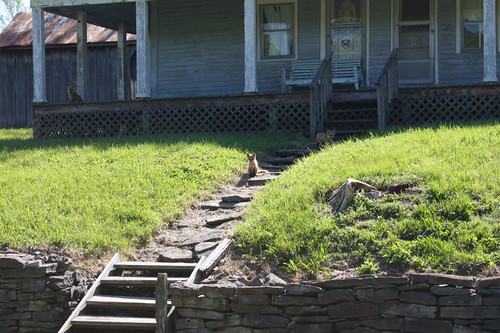
Family of foxes (Red fox, Vulpes vulpes).
(*photo credit)June 15, 2011 Good
News Will Ultimately Triumph Over Bad News
Good news for much of the
mass media is NOT news. Often natural disasters are intermingled with mass
killings and armed struggles to create the 24-7 news cast. The good deeds of
others are hardly newsworthy. However, the challenge for bearers of Good News
is to make it appealing to a broader audience. How can this be done given the
limitations of today's media?
One
solution: Accept bad news and make it palatable. Why fight bad news, for
it is out there for presentation and reception? Just see the troubled world as a
reality in which we come to cope, and yet go on with our lives. Take for
granted that the reporter who finds such existing phenomena is more worthy of
promotion, and so the scramble for more and more hidden sources of evil and
destruction is better for more vivid reporting. The one response is that the
story could have been worse, so some other example from past history is dredged
up to beat the previous tale.
Alternative
solution: Overpower with good news. The opposite of bad news is a plethora
of successful plans, reports and past stories of positive actions by people who
have made a difference. It is promoting a series of human models who overcame
the odds and performed feats of glory. An in-built problem with this is that
the models are often painted better than life. This may lead people to retreat
into their own inner misgivings as to whether they could imitate the performers
in the success stories. If they are true, they are exceedingly rare.
Balanced
approach: Mix good news and bad. A sense of failures and successes could
be regarded as a realistic approach of which some media do attempt to comply, at
least in the total weight of the news when once past the headlines. Much
depends on how the story is composed. In an age of troubles (stated and
discussed), good things still happen. Really, the balance does speak of
success, but the tendency is to water it down to a world view that removes any
attempt at earthly sainthood and leaves the total impression that nothing is
perfect or completely successful.
An
emerging solution: focus on ultimate success. Perhaps there are too many
good and bad items, and we suffer from information overload. More attention
must be given to singular events that focus, rather than spread out scatter-shot
across the media landscape caused by competition of multiple outlets. The
current situation is an overwhelming scene. Ought we to pick and choose, or is
this not the expertise of the news director? Ultimately we are our own news
directors, and what we watch is up to us and to our ability to decide not to
surf channels but to settle on what is most needed here and now. Discerning
will have to be up to us, and our clear vision of a future will help in our
decision-making.
Prayer:
Lord, give us the courage to find the news best suited for our benefit and to
help others do the same.

Mt. Robson, Canada.
(*photo credit)June 16, 2011 Elk
and Large Wildlife Presence and Proliferation
Look,
Elk! Some admire a grazing herd of elk -- especially if they are reintroduced
to an elkless area (see March 3, 2007). Elk numbered about ten million in North
America at the arrival of Europeans in the seventeen century. In the East they
were hunted to extinction, though now are reintroduced. Sightseers engage in
tourism's number-one activity: nature viewing, and elk can enter the picture.
Admirers are attracted to the male elks' majestic antlers grown annually as
equipment to defend their harem and offspring. However, until recently elk
sightings were limited to the West and the sounds of elk forgotten. Elk cows
bark to each other when in danger, mew to keep in communication, and whine to
signal to calves, who bleat for their mothers when disturbed.
The
reintroduction of native elk in the East includes their presence now in sixteen
Kentucky counties. However, the tourist potential in regions where elk are
hidden often in wooded areas is more limited than in the vast grasslands of the
West. The presence of elk has a value in itself and this ought not to be
discounted. Furthermore, elk continue to be prized by Native Americans and
hunters as an abundant source of meat and for other body parts. Today, without
natural predators the elk numbers naturally increase and can become worrisome to
local residents; the elk are agile enough that they can damage expensive fencing
if they so desire; they may like to enter and harm cultivated areas.
Undoubtedly,
denser human and elk populations seem to clash. When wandering elk leave their
prescribed county boundaries, state agencies are permitting harvest in order to
have some semblance of control. Note to hunters: will you help balance elk,
deer, goose or other wildlife to the carrying capacity of the region? These
species can become sources of locally-grown meat with no payment to meat
producers. The elk meat is now becoming readily available, organically-grown,
free-ranging, local food for those living in the reintroduced areas. Much
depends on how well these reintroduced herds continue to prosper.
Elk
are not alone in wildlife mammal presence. Bears are appearing more frequently
in our mountain areas, but that is through natural colonization or spreading
from other regions. The same has been the case of deer that lack their native
predators and are safeguarded by regulated hunting periods, along with specific
harvest methods and limits on numbers. Stability in number and carrying
capacity of these species are important ecological considerations, for each
needs feed (vegetation) and habitat. Elk and deer make excellent food for local
consumption, whereas bear meat may be less appetizing. Excess elk can be
removed to restock other areas. All in all, the presence again of these native
species is most welcome, and may become an attraction to many visitors as well.
Prayer: Lord, help
us to admire the majestic creatures you have made and to furnish them with
quality habitat.

Windmill for supplying water to livestock. Western Nebraska.
(*photo credit)June 17, 2011 World Day
to Combat Desertification and Drought
What
can we do when it won't rain? I don't have resources to hire planes to fly out
and seed clouds in those affected dry regions. We can do one thing of utmost
importance -- spread the word about climate change costs. We live in an
age when those craving the status quo tend to deny what changes are actually
occurring. We have to follow the example of the Old Testament prophet Jeremiah
and introduce a discussion of where the world is going. Climate change is worth
considering as a culprit. This phenomenon causes increased desertification to
thousands of acres in the band across north central Africa where the Moslem and
Christian worlds meet and occasionally clash.
Politically, this region of desertification is a highly sensitive area as
turmoil in Nigeria, Chad and Sudan testifies -- and the Sahara marches on. The
same problems afflict other especially western Africa nations as well as parts
of Eurasia, Australia, and parts of China. Other climate change effects could
have serious political ramifications as well, such as flooded Pacific and Indian
Ocean island nations.
Economically,
climate change is devastating and is reported to result in $4 trillion in costs
to environment, health, and food security. This estimate was compiled by
experts for the International Finance Corporation, a component of the World
Bank. Such impending environmental losses could cripple investment efforts from
pension funds to national sovereign funds. Without remedial measures the
impending situation could limit recession recovery.
Socially,
the effect of enhanced storms, floods, heat, cold, AND droughts will be enormous
on certain groups of people who find it hard to migrate or mitigate
circumstances. We recall how the very poor were trapped at the time of Katrina
due to immobility. The same could be said of many people in Niger or
Bangladesh. A severe climate change -- if current energy-use practices continue
-- will have dramatic effects on the community life of perhaps two hundred
million people in drought- and flood-prone nations.
Culturally,
the drawbacks of climate change may have the most devastating effects. When
cultural groups are threatened, they may withdraw into isolation for the sake of
self preservation and create barriers that keep others out; in contrast, some
ties break down in times of extreme pressure and communities break apart as
migrants move to what are perceived to be better locations. This is
particularly true in flood- and drought-prone areas.
Prayer:
Lord, teach us to see the current situation and how we as a people are causing
what is happening on our planet as deserts advance through overgrazing and in
climate change conditions. Help us discover and acknowledge causes and seek
ways to heal our wounded Earth.
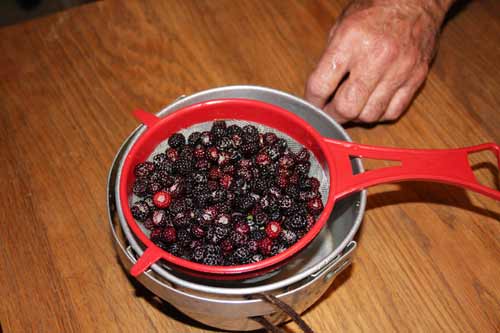
Freshly-picked wild growing raspberries. Washington Co., KY.
(*photo credit)
June 18, 2011
Raspberry Season Fosters Creativity
Now it is time for
raspberries -- those sparkling berries with the intense taste. We have
mentioned blueberries, blackberries, strawberries, mulberries, and elderberries
in past years reflections -- and wish to note the flavorful raspberry as well.
Raspberries are nutritious, being very rich in Vitamin C, and in folic acid,
niacin, and riboflavin. The distinct intense taste of raspberry has long made
it a prime candidate for drink and foods, especially bakery goods. Whether
cultivated or wild (European are red and North American are black), raspberries
have a multitude of uses of which some are worth recalling. Don't hesitate to
pick them and eat on the spot, for raspberries are difficult to preserve for
long and still retain that vine-ripened flavor. If taken home, try chilling and
serving with sugar and cream or consider alternative ways to prepare them:
Angel Food Cake (with
raspberries mixed or as topping)
Bananas and other fruit
mixes
Brandy from raspberries
Bread with raspberries
Candy (especially hard
candies, cream candies, and chocolate- coated varieties)
Cheesecake
Chicken breast (with
raspberry sauce)
Cobblers (it takes many
berries but could be mixed with rhubarb or
strawberries if available
Cottage Cheese (mix in whole
berries)
Curd
Eggs
Fruit cocktail
Fruit juices (alone, it is
strong and so it can be mixed with cranberry or apple fruit)
Ice cream (homemade or as a
topping with commercial vanilla)
Jam or Jellies (alone or with others such as blackberries)
Oatmeal cooked (one of the
Year 2011's "365 varieties" or sprinkled on cold cereals)
Pancakes (mixed in the
batter or used as a topping)
Pies (strong, and can be
mixed with apple or blackberry to enhance flavor)
Puree
Salads (even vegetable for
color and flavor and tuna salad)
Syrup (add juice to apple
syrup)
Tea (use the berry or the
leaf)
Tarts (Manchester
variety)
Toppings (for cakes of all
sorts)
Trout (add raspberries
either in cooking or as garnish)
Turkey with raspberry sauce
Vinegar
Wine
Yogurt (a flavor enhancer).
Prayer: Lord, help
us be creative with raspberries, one of your most wonderful and delightful gifts
found in nature.

Hollyhock, in full bloom.
(*photo credit)
June 19, 2011 Sharing
Blessings and the Trinity
Blessing
another is our response to the God who has invited us into the divine Family.
To bless is to extend ourselves to others and to share our blessings with them.
We acknowledge our elementary common heritage as part of the human family -- and
now we experience the special invitation to become more godly in our actions.
We can bless all and do so freely -- to butterflies, mushrooms, lichens,
evergreens, berries, birds, and amphibians. We bless a land teeming with all
types of flora and fauna; we bless the entire blue-green planet tarnished by
exploitation; we even bless the Creator of all things. Natural beauty leads to
respect, and respect to blessing -- the prelude to earthhealing.
We
bless the agents of change, those who protect resources and heal Earth's wounds,
those willing to confront misdeeds and the ones who commit them. Our blessings
return to us and empower us. Even damage we now observe amid fading natural
beauty makes us aware of original blessings, deep down and yet wrapped around
with the paradox of fragility . Blessings return to us in damaged land and
trigger action now, today. We care because we believe in what is here and what
we can share. God's favor is perceived as "ours," not mine or yours alone.
Let's bless together, for blessing is the acknowledgment of togetherness in the
Lord.
If
someone says, "Get off my land," we are disturbed, for such acts restrict our
personal enjoyment of gifts. With surprise we ask, "To whom does this land
belong?" Actually the stark reality of possessiveness strikes us at the moment
when raw beauty floods our soul. Some may depart without a word; others may
express anger; still others resist and confront the supposed owners. As though
awakening from a dream, we face the reality that the beauty of the commons has
been privatized (at least through some legal mechanism) by the wealthy. These
enclosures of the commons mar beauty, for it cannot be appreciated by everyone.
This raises questions: How can we manifest our common sharing of natural and
enhanced beauty with all people of good will? Do those who possess places
restrict our common sharing of natural beauty?
At the moment of blessing we
find a curse hidden deep down in the world that we regard as commons. The curse
is uttered by the shouts of those who want us off their property, the "No
Trespassing" signs and the lack of civility on occasions that are luxuries to
some, and yet are needed as essentials by others. Those who bless, are
sensitive to the unspoken curse. To reclaim the commons means that we must act,
not merely admire, nor merely cast blame. Natural beauty is a blessing; our
action to enhance it is a double blessing. However, we must face reality;
curses are out there, and recognizing that fact keeps us from becoming too
naive. By admiring natural beauty we are drawn to God. We accept the
invitation to be active members of the Divine Family.
Prayer:
Holy Trinity, allow us to see your oneness and to find our reclaiming as part of
the blessed gifts given to us.

Aromatic aster, Aster oblongifolius.
(*photo credit)June 20, 2011 Elitism
Versus Democratic Values
An earnest neighbor actually
countered my statement of fact that the wealthiest 1% of Kentucky's residents
pay the lowest rate of taxes. To my utter amazement his reply was, "Why
shouldn't we favor them? They furnish us with jobs, don't they?" In his mind
the elite are certainly present and ought to retain their "eliteness." He
thought he was a good citizen by defending their claims, their manner of speech,
subtle ways of acting, their privileged company, and their methods of promoting
"charity" work. He perhaps was comforted that elitists could elaborate on their
blood line, wealth, power, fame, academic degree, or historic precedent -- e.g.,
"Daughters of the American Revolution."
Democracy can be
malleable. During the earliest days of this Republic, efforts at making
George Washington a king showed the desire by some for nobility. This was
resisted by other participants in the Revolution -- and differences led to
partisanship towards the end of the eighteenth century. In hidden ways, the
desire for recognized nobility is still strong today; namely, in efforts to
maintain elite positions through exclusive clubs, recognition at events,
publicity in press and other media forms, importance of CVs, recognition of
authority, and in unconscious biases against certain groups of people. The
sonorous voice contributes to elitism as do certain types of residences or
vehicles or social associations for show.
Democracy
is fragile; it suffers by distinguishing several classes of citizenry,
and this leads to discouraging so-called second-class citizens from assembling
and participating. "Let the experts do the job," is quite tempting -- and this
means relegating citizenship to the elite. This apathy is reinforced by the
following unfair and undemocratic activities: preserving tax privileges for the
wealthy lest they cease being elite; deferring to those regarded as expert
whether or not they know the situation; and placing higher judgment on the
theoretical over practical experience. The non-elitists suffer from lack of
critical recognition, and thus may strive to present themselves as satisfied
with the current status quo.
Democracy
is open and public, for in theory all citizens have a voice and that
voice ought to be heard. However, we suffer with instant and preferred media
coverage to those of special attention. Amid the chatter, democracy is best
served truly by listening and understanding the reasoning of the practice, the
wise, and the folks with common sense, not just the notable and talkative. Good
reasoning is often drowned out through political posturing. The flood of
information and the multiplicity of news channels confuse many citizens who need
time to reflect and are hesitant in voicing their positions. Let's learn to
listen beyond the elitist drone.
Prayer:
Lord, help us to see that we all are humble servants before your majesty. What
supposedly makes us in our opinion "elite" could set us apart from the nobility
of the commons.
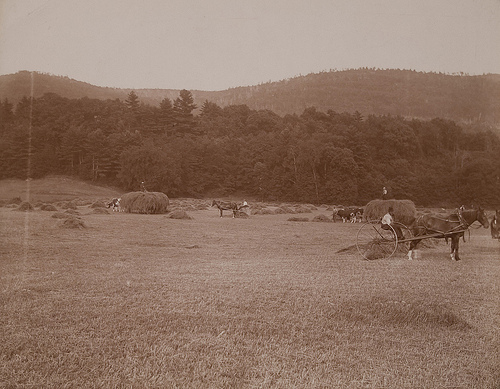
Making hay. Photo Creation Date: 1900
Museum of Photographic Arts, Gift of Stephen White. (Creative Commons License)
June 21, 2011
Similarity in Making-Hay and Healing Earth
Summertime!
Today a year ago, I mentioned the beginning of the major harvest season (haying)
in the northern hemisphere. This is the season when the tall grasses are being
mowed and allowed to dry and then collected and stored in some suitable manner.
In recent times hay is rolled into large quarter-ton bales and often left in the
field until needed in winter. In our childhood farming days, hay bales were
smaller, and we would struggle to put them on wagons and take to barns for
storage or to make hay stacks (in order to protect a major portion from the
weather). Then and now, the aim was to "make hay" during optimal times of
vegetative growth and highest nutritional content. Thus the expression to "Make
hay while the sun shines." Don't do it on rainy days (or the hay will mold);
don't waste sunny days when the hay must be made (the optimal hay harvest period
is limited and days are longer). A similar saying is "strike while the iron is
hot," or right now.
Why
as summer begins? As discussed last year (see June 21, 2010) hay-making is
similar to Earthhealing. While our healing task continues over a temporal span,
an optimal suitable time is obvious to the observant and conscientious person.
We cannot put off acting, for the human factors that contribute to environmental
damage (carbon dioxide, carbon black, methane, and a number of other air
pollutants all add to an ailing planet in need of proper care. The summer
solstice, the longest day is the optimal time to reconsider the urgency of the
current situation. Tomorrow begins the process of the shortening of days, and
so less of this precious temporal commodity will be available.
Hay-making
teaches us something; the operation is hot, sweaty, and dusty work -- though
ultimately richly rewarding, especially as feed for cattle in wintertime. The
animals will cherish the product being preserved, and so the investment is worth
it -- a long-term investment when those who benefit are not the ones who make
the initial sacrifice. Earthhealing has a similar role to play. Earthhealing
procedures to avoid climate change will be cherished and enjoyed by parties who
are not now making sacrifices -- but we have faith in the long-term benefits.
We need to accept responsibility for what must be done (no denial), realize our
personal responsibility (no excuse), and act according to the talents and skills
at our disposal (no escape). We are willing to invest time and effort to help a
future generation that will live after us. They demand our generosity today
for we do not put work off until tomorrow. Each day lost in the struggle to
control climate change makes it all the harder in the future. Promoting a sense
of urgency is part of our mission.
Prayer:
Lord, help us see today's hay-making as somewhat different from last year's, and
yet just as urgent with respect to the threats facing our wounded planet. Help
us act now, for to heal means we cannot delay. Help us know the time is right.

Female cardinal in blooming quince.
(photo: Sally Ramsdell)
June 22, 2011 Should We
Preserve Nature as Untouched?
Wind
turbines are certainly noticeable, and some landscapes can change dramatically
when these are installed. This situation leads to disputes over change of land
use, though farmers can testify that land on which turbines are installed is
still used for agricultural purposes (grazing and growing crops). Purists want
the land to remain visibly untouched, and accuse resource owners of placing
"economic value" on natural phenomena. Resources can be computed for tourist
potential by counting lodging, meals, and fuel purchases in the given region.
However, all concede that "priceless" viewscape may be separated from pure
economics; for purists, placing value on nature is simony -- buy sacred items.
Those
who assign monetary value to nature overlook the spiritual content of God-given
gifts. How do you price natural beauty even though creative artists may get
good prices for their depictions of how scenes touch them? Many lovers of
nature resist allowing natural beauty to become a commercial commodity to be
bought, sold, or used and wasted at will. I recall homeowners who devastated an
Appalachian viewscape by erected gaudy houses at key locations -- and ruined the
total view for others just so they could look out from their privileged location
to view nearby unspoiled beauty. This is a public demonstration of the change
or touching of nature for individual selfish use.
In
seizing what is part of the commons, commodity-makers denigrate the shared
democratic values of all citizens. Champions of natural beauty see the forest
as having aesthetic value in itself; exploiters see forests as home sites, or
timber and logs, or even as having tourist potential. Yes, they agree that
tree-cutting can be defacing the landscape for a period of time, but attest that
the forest will return. Yes, roads to tourist destinations along with motels
and service stations are the sacrifices for others to accept in admiring natural
beauty, but it takes planning for least impact.
Should
human activity include retouching natural beauty? Rene Dubos argued that human
efforts can enhance nature and it is part of the nature of things to do so.
Beauty can be a blessing worthy of praise. Wind turbines for general community
use as utilities can change the views of mountains, plains, and seashores.
Should windpower technical innovations be permitted? Some landholders are
offered $4,000 per year for each installation -- good income for struggling
farmers and mountain dwellers. Isn't beauty in the eye of the beholder -- and
those areas suffering from coal mining and powerplants emissions are not a
pretty scene. Critical issues need addressing in this century: when is
viewscape change permitted? Necessary? Accepted? Welcomed? If windmills help
add charm to the Dutch countryside, could they enhance America's as well?
Prayer:
Lord, teach us to value the things of heaven and still be willing to find value
in both untouched nature and the value of what is touched and enhanced by human
hands.

Vedauvoo formation, Wyoming.
(*photo credit)June 23, 2011 2000th
Essay: The Future of Earth Healing, Inc.
Why
talk about the future now? A student at the University of Kentucky wanted to do
an essay on this locally-based organization and so asked a series of searching
questions -- This occurred on the day when I was drafting the first copy of this
reflection. Is that as profound as we can make it? Earth Healing, Inc.
is a practical organization that is "lite" on structure.
The
EH modest goal is environmental information to and by believers, who affirm that
we can heal our wounded Earth and see it as a sacred duty to do so. More
succinctly, the goal is to make religious values count and be incorporated in
healing our threatened planet. EH's future involves a faith in the future.
Prophetically, we can speak with some degree of certitude about a possible
outcome, if remedial steps are not taken. Conditionally, this will happen
unless ... It takes common sense and no special charism to say what will happen
to our country if annual trillion- dollar budget deficits continue to burden our
government programs. In the same way, if losses burden EH, then goals will be
affected and a future redirected. EH has suffered from the passing and loss of
both Mary Davis and Kristin Johannsen in the past eight months. Both are
irreplaceable, but we are drawn to modify editing and production procedures to
keep our goals sustainable and intact.
If,
for some reason, we are blessed with resources that include continued financial
ones and volunteer assistance (as what Kristin gave us), then what could the
future be? For one thing, our information service does not directly solicit
feedback, and yet we receive as much as we can handle given our time
constraints. I get more emails per day (after the removal of massive amounts of
junk mail) than I got in the entire year of 2004, the first year of the Earth
Healing website. It would be good to invite discussion, but what baffles us is
just how could we respond to the satisfaction of the viewer/participant as we
move forward? This unanswered question relates to expanding a goal in a healthy
manner, but what type of new structure does that entail?
Time
is of the essence and yet the Greeks tell us there are two times: Chronos
(or clock time of our 24 hour/day) is in short supply; Kairos (the NOW
or acceptable time) is ever more pertinent. Our future depends on whether we
can balance these two types of time, to keep the NOW before us without the many
detours that are on other people's agendas. We have considered a future that
includes blogging, but this opens us to screening of an assortment of
contributions, or risk losing the urgency of Kairos. We have considered
teleconferencing that saves people immense travel time and could be
meaningful. This modification is still on the table and we welcome comments,
for that could determine the future of this website. We could invite guest
essays to accompany the ones through the route attempted here.
Prayer:
Show us, Lord, what to do so we can present a future that fulfills our goals.

Appreciating the beauty of tender blooms.
(*photo credit)June 24, 2011
Creating the Future: A Healed Earth
Yesterday,
we reflected on future hopes for our earthhealing process. The goal is to heal
our troubled Earth through citizen information and participative activities
dealing with environmental protection and remediation. The driving force is a
religious foundation and belief that people must have a faith in the future.
Today, people see little need for even reflecting on a future beyond their
mortal life. For these people the future is indefinite, and so as faithless
individuals they look little beyond having their ashes scattered on some
memorial stretch of landscape, water body, or specific site by friends or
relatives. Remembrances pass with that of mortal companions.
A
future can be created for us and we can participate. America's Founding Fathers
did believe in a future for this country and expected us to do the same. Yes,
we can believe that in 2050 our planet could be on the road to being healed, and
justice for all will abound. We hope that at that time food security will be
established for ALL the world's future nine billion people. We hope all will be
vaccinated and have access to primary health care facilities. Would that they
could: live in respectable housing; enjoy adequate recreational facilities; have
potable water to drink; be able to read and write; and be connected through
rapid communications to loved ones. Why possibilities? Don't they demand an
unattainable global social justice?
The
answer is that one could set goals too limited and in doing so feel satisfied to
feed the person who comes to the door, or give a donation for housing in Haiti
-- and confess a fuller world of justice is impossible, so why waste time
talking about it? Limited goals show a limited faith, and that shrinks
expectations and hopes. The disease of the futureless agnostic or despairing
resident can infect a community with scoffing at youthful dreams and create an
atmosphere of cynicism; so can those of limited expectations doubt whether the
disparity of wealth will vanish. But how can we remain contented?
Religious
practice should generate holy discontent with the status quo and limited
expectations. Will we have to risk possible marginalization and peer
rejection? We can be developing a state of tranquility and yet well suppressed
underneath is a state in anxiety that we are not doing enough. Granted, with
the world in such troubles, we are called to do more ever realizing that we will
not be total authors of our future, only participants. Such recognition of an
imperfectly executed future calls for a basic humility. We cannot foresee what
is to come, for a future generation will have to challenge the conditional,
"What if no one else believes, no one else cares, and most think they can do
little more than preserve their precious individuality."
Prayer:
Lord, give us as food from heaven, nourishment to be happy to be on the right
road, and yet discontented enough to seek solutions to the problems facing our
hungry world.
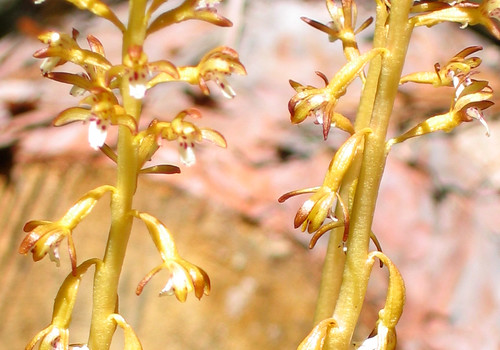
Spotted coralroot, Corallorhiza maculata. St. Ignace, MI.
(*photo credit)June 25, 2011 Time to
Make Cucumber Pickles
Why,
with all the important issues in our world, are we talking about making
pickles? Answers: we have cucumbers to spare and ought to preserve them; we
need to be creative in preserving food and do so with the least amount of
effort; pickles taste great when well preserved -- and greatly enhance the
quality of meals.
Produce
galore! I plant many hills of cucumbers because they are a favorite and the
vines can grow vertically on fences; they do not take up that much horizontal
space in a limited garden area. They grow fast and need picking almost daily or
otherwise the fruit gets too mature and the skins toughen even in the pickling
solution. One can eat some two meals a day and give others away for this is the
season of garden plenty.
Pickle
creatively! I like to fill the refrigerator space with gallons of pickled
cucumbers. Granted there are packages of rather expensive commercial pickling
mixtures that are mostly salt plus select herbs -- but one can be creative in
using the homegrown or commercial spices that are available for far less.
Mixtures of these herbs and spices in different proportions generate unique
tastes for each portion pickled. Sweet pickled batches require sugar in
generous proportions and that adds to the expense. I prefer the sour varieties
made with boiling aqueous vinegar/herbal mixtures over the packed cucumber
slices along with other veggies that add much to culinary creativity.
Container
Companions! I use glass jars as containers but others may use plastics (no
metal please). Include diced homegrown peppers to add spice to the pickles.
Choose companions that suit your family's and guests' taste buds; if you want
really spicy cucumbers keep the pepper seeds in the pickles. Over time I have
added mixtures of various other produce from the garden: carrots, green beans,
onions, garlic, dill, and parsley in different mixtures and amounts.
Creativity encourages the immediate impulse and access to supply though a pickle
person may want to notify users by notations on jar labels.
Prepare
well! My mother was a master pickle person; she put the cucumbers in
five-gallon stone crocks and changed pickling solution every so many days. This
required time and care but the products were great in both texture and taste.
She also canned pickles in quarts according to her own recipes. I do not have
such loving care nor time, and so I pour boiling pickling solutions over the
packed jars and immediately screw the lids on tightly, and thus create a vacuum
that helps preserve the taste until use. The jars are allowed to cool and are
stored in a refrigerator. Since store-bought pickles are costly, pickling could
be one of the most economic practices of the homegrown-garden yield.
Prayer:
Jesus, you tell us to be salt of our Earth and to use the salt ("brine"
solution) until it loses it savor. Let us recall that salt means fidelity and
wisdom -- and so do pickles.

Sessile trillium, a jewel in the understory.
(*photo credit)June 26, 2011 Corpus
Christi: An Activist and Holy Discontent
Corpus
Christi is about food, and challenges us on our journey of faith. This is the
Bread of Life of which we are fed. So part of the glory of today's feast is
that we are spiritually fed. But the Fathers of the Church tell us that if we
know of others who are hungry and we partake of this spiritual meal, we do so
unworthily if we do not first feed the hungry. Our trouble today is the
shrinking nature of our global neighborhood -- those on the other side of the
planet are now our neighbors, and a billion of them live with extreme food
insecurity. Besides, billions are confronted with rising global food prices and
food shortages.
Feeding is then a two-way
street. We must both be fed and feed; be fed spiritually and physically feed
those who are hungry. The two are together and that raises us to a level of
holy discontent. In doing so, spiritual hunger is alleviated. Judgment is
really all about food. You might ask why the emphasis; that is because other
faults breed insensitivity arising from self-centeredness, greed, and succumbing
to self-allurements. In this insensitivity we fail to see others in need. From
this emerges the dilemma related to the BIG question: Lord, when did we see you
hungry and feed (or fail to feed) you? What if the answer to some or many of us
is:
When you allowed a
thousand billion to get away without paying fair taxes and a billion people to
go hungry and you didn't do a thing about it, you did not feed me.
This
response may haunt us; some have said if people do not get it resolved it could
drive them crazy. My response is that we will either go crazy or we will change
our ways -- for we still have time to decide. What we cannot do is continue "as
is," for the question is what we will ask and not that will be asked of us. The
feast of Corpus Christi recalls our dilemma and our judgment.
Change
means that we take our citizenship seriously and participate the best we can.
Some will respond by finding the emaciated and hungry and contributing to relief
agencies (Catholic Relief Services, Bread for the World, or others). However,
the activist knows there is far more at stake, because merely doing little
things, no matter how many, fails the democratic process of which we are
members. For the activist, charity or direct donation is a short-gap measure
because the hungry are in need today, right now. We cannot delay such needs
until tomorrow. If we do nothing to prod legislators to do their duty and levy
fair taxes, then the dilemma continues; if we act, no matter how successful we
are, we allow fairer use of resources in this world of great disparity of
wealth; we will encourage the lowly to rise -- and those in high places to come
down. We must change -- and the Body of Christ nourishes us enough to take this
important step.
Prayer:
Lord, help us to see and believe, and to show that we believe that we can feed
others in various ways.

Kentucky-grown royal paulownia, Paulownia tomentosa. Harlan County.
(*photo credit)June 27, 2011 Paul
Bunyan Day and Pax Americana
Tomorrow on Paul Bunyan
Day we ought to consider the power of individuals, not only the physical
power of the mighty logger, but a longer-lasting moral power of individuals and
groups. Yes, for a period of time strength like the summer sun waxes supreme,
but nothing is lasting on this Earth, and that physical power and strength will
fade with time. We need to see the connection between individual and national
strengths also. To expect our country to shoulder the military burdens of the
world is unfair and unsustainable; we need to reevaluate the part that this
country must play in being policemen (and women) of the world. Why? Is it
because we have a host of spoiled brats that do not want to bear their
respective burdens in world security? Maybe it is not that severe, but the
hesitancy of some youthful folks may be indicative of something wrong somewhere.
The
following poem was written in 1995 and is somewhat dated but still has
pertinence today. With Middle East revolution so widespread and profound this
year, a word of caution is still operative. Maybe in retrospect the lesson is
still before us. We are unable and will remain unable to create a peace through
military might. The fact is emerging that security does not come from planes
and bombs and warships, but through establishing a harmony in use of resources,
and this can establish a global peace.
PAX AMERICANA
No one cares, no one
seems to wonder
Whether God still
rules the thunder.
Awake, en masse, are
these bombs, nerve gas
escaping his notice,
weapons of crass
misguided souls, wound
in righteousness,
Or calloused
licentiousness?
So we ponder our
leaders' blunder
Blasting burrowed
innocents asunder.
Will it cure the
madman's dream,
or throw off his
cruel regime?
Or do we seem to
deem
Our army, navy, marine
Reign globally
supreme,
On airwaves beam and
torrid stream,
With high tech
head-of-steam,
and misplaced U.S.
self-esteem?
Redeem us, Lord.
Redeem.
(Written while expecting
President Clinton to bomb Baghdad in 1995.)
Prayer:
Lord, give us insight when we age and wane in physical energy; help us see this
is a time to grow in wisdom and to strengthen our moral powers to confront
insecurities all around.

Red-spotted newt (Notophthalmus v. viridescens).
(*photo credit)June 28, 2011 Kentucky: A
Touch-of-Green Positive Aspects
This
reflection is taken from a talk I gave in February to the Kentucky sanitation
and environmental workers at their annual meeting in Louisville. My Internet
website readership is derived from over one-hundred countries, and I suspect
that their respective environmental engineers face the same problems that we do
in Kentucky: tight or reduced environmental budgets and many new problems to be
handled by fewer staff. However, the work involves keeping our environment safe
and maintaining an ever-higher quality of life for our citizens. Green is the
color of summer vegetation and the color of activities needed for proper
sustainable living. Let us look at six positive green approaches:
Solar
Energy -- Our state's response to dirty coal is the Kentucky Solar
Partnership, an organization sponsored by the organization I co-founded,
Appalachia -- Science in the Public Interest. At present, the fastest
increasing American renewable energy source and most competitive fuel source is
wind. However, solar costs are declining, and wind potential here is less than
in neighboring Great Plains states. Solar is the proper choice for us to
emphasize, even though we need a mix of suitable energy sources.
Edible
Landscapes -- Greenery can be just as great with edible landscapes as with
green lawns. These edible landscapes include fruit and nut trees, gardens, and
wildscape for wildlife habitats. All can easily replace at lower costs the
monocultural lawns of bluegrass that must be mowed weekly and are subject to
drought.
Flowers/Gardens
-- Gardens are a painted landscape that changes with the week or month of the
growing season. Think about inserting flowers into all vegetable and herbal
gardens.
More
Trees -- We can list at least forty beneficial aspects for many of the over
one-hundred varieties of trees found covering half the surface area of our
state. Youth and elders can work together for planting and maintaining this
valuable forest cover.
Ecotourism
-- A far greater potential for new jobs could come from the service industry
dealing with feeding, lodging and entertaining tourists who come to our state
for a nature experience. We have mountains, forests, nationally known caves,
gorges, natural bridges, waterfalls, state parks, and historic and cultural
sites and events. Ecotourism is a win-win situation.
Wildlife -- Reintroduction of elk in seventeen counties and deer and
"wild" turkey in all parts present benefits and risks. A wildlife balance
demands reintroduction and promotion of native predators (fox, wolf, mountain
lion, etc.). Food needs ought to be satisfied locally and one candidate is
surplus wildlife.
Prayer:
Lord, teach us to act in ways that will retain the higher quality of our
landscape, for this is needed to uplift our spirits and improve our community
life.
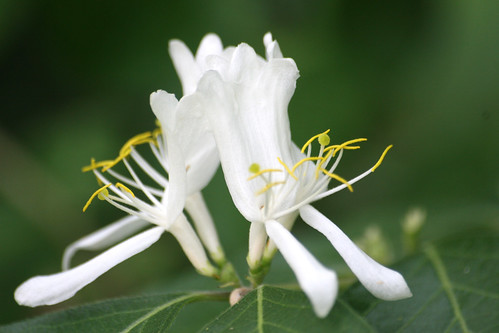
Invasive exotic Kentucky plant, honeysuckle (Lonicera).
(*photo credit)June 29, 2011 Kentucky: A
Touch-of-Green Negative Aspects
Keeping our state green
takes a balance of positive steps and those areas of restraint where we confront
problems that threaten that greenness of landscape. The following are six areas
needing restraint and change of practice:
Urban Sprawl --
Central Kentucky has suffered severe losses in recent years of prime farmland,
as documented in the report "Farming on the Edge" by the American Farmland
Trust. The state is blessed with deep rich soil that attracted early
pioneers from the East Coast, and this is a treasure worth preserving well.
Smoking Powerplants
-- Kentucky is listed by the Environmental Integrity Project as the
seventh most carbon polluting state in the U.S. The large number of coal-fired
powerplants in the Ohio River Valley contributes to this pollution. While some
of the electricity generated is used in neighboring states, it still indicates a
bad trend all around. Better pollution control devices could capture or check
some of this pollution, and coal residue can be used for concrete manufacture
and other industrial uses.
Billboards -- These
commercial devices plague landscapes and ruin viewscapes treasured by
sightseers. If tourism is meant as a job-builder, we focus on sightseeing, the
number one tourist activity. Billboard information could be presented through
informational literature and properly placed road signs.
Junk Food --
Commercial eating places supply junk food that contributes to our state's
obesity problem. CSPI, a nutritional organization that has just celebrated its
fortieth birthday, calls attention through its Nutrition Action Newsletter
to the goal of healthier food, food that needs a green landscape for production.
Unreclaimed Land --
Abandoned lands, farms fallow in preparation for development, deforested areas
and un- or improperly reclaimed surface-mined areas all damage the beauty of our
state. Selected vegetation need not be exotic species such as Russian olive. A
far more attractive tree crop is the fragrantly blooming (in May) black locust
that could be utilized for a possible renewable biofuel.
Invasive
Species -- One could compose a sorry listing of at least two dozen exotic
and invasive species of plants, most of which furnish a facade of greenery by
choking and crowding out the native plants. Kudzu is the prime culprit in many
parts of the Commonwealth, to which one can add purple loosestrife and Japanese
honeysuckle to multi-flora rose and mugwort. Some environmental experts regard
these as the greatest threats to the environment.
Prayer:
Lord, teach us right action and how and where to observe the threats that come
our way.

Southern red trillium, Trillium sulcatum.
(*photo credit)
June 30, 2011 Questions
at the 2011 Half-Year Review
Can you believe that the
year is half over this Sunday night? Where did it go? As we age time seems to
fly faster. In just six months it has been a time of budget battles, revolution
in the Middle East, and earthquakes and tsunamis in the Pacific Rim. With
profound change in the air, we ought to ask ourselves some basic questions:
Spiritual Life:
*
Have I grown spiritually in this fast-fleeting year, and do I give some quality
time to prayer?
* Do I let events, whether
local, regional, national, or global, make me dispirited?
* Do I treat my associates
and neighbors with proper respect and kindness?
*
Do I make too many excuses for my inability to do the right things when they
need execution?
* Is my 2011 spiritual
retreat planned or completed?
Health & Physical Wellbeing:
* Am I getting enough
physical exercise as weather changes from winter to spring, and to hot and muggy
summer?
* Do I eat right and avoid
excess of those things I like?
* Do I focus on foods of the
season? Am I growing my own garden produce and preserving or giving away
surplus?
* Is my vacation planned or
executed?
* Do I take prescribed
medicines and honor appointments?
Social Life:
*
Am I overly connected through cell or land phone, email or just chatter, thus
wasting time?
* Do I plan ahead? Do I show
equanimity when what is planned goes awry? Am I flexible enough to change
plans?
* Am I following free time
needs and rest in periods daily or weekly? Do I allow rest to translate into
being even-tempered with those with whom I must interact?
* Do I choose to read good
materials both of spiritual and secular nature?
* When I relax, do I really
do so and in a way that all benefit, especially those for whom I do service?
Economic Life:
* Do I live according to the
budget or do I overspend?
* Does auto travel involve
true economy of fuel?
* Do I purchase what is
needed or is money wasted on unplanned impulse
buying?
* Do I patronize the local
farmers' markets for foods not grown in my garden?
Prayer:
Lord, thank you for seeing me through this much of my life's journey. Help me
to be honest with my progress and to resolve to continue in a spirit of hope for
what is to dome.
|